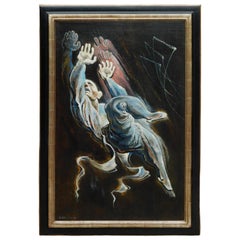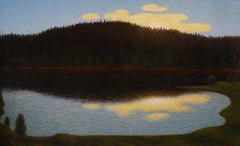Georges Schreiber Paintings
Georges Schreiber was born on April 25, 1904, in Brussels, Belgium. After studying in Berlin, London, Rome, Paris, and Florence, he moved to New York in 1928 and spent the rest of his life in the U.S. “I don’t want to be just an American with citizenship papers,” Schreiber declared. “I want to completely associate myself with America.” Besides his career as a lithographer, Schreiber was also a painter, illustrator, watercolorist as well as a teacher at the New School for Social Research. He was a regular contributor to several national magazines and an author and illustrator of several books. Throughout his career, he exhibited at the Metropolitan Museum of Art, the Museum of Modern Art, the Art Institute of Chicago, the Whitney Museum of American Art, the Carnegie Institute, the Corcoran Gallery of Art, the Pennsylvania Academy of Fine Arts, the White House Library, the Library of Congress and Bibliotheque Nationale, among others. He garnered numerous awards, including the William Tuthill Prize. Growing up in war-torn Europe, Schreiber was profoundly impacted by the horrors he witnessed. As a family of German descent living in Belgium during the First World War, the Schreibers were scorned by their neighbors, when they later returned to Germany, however, they were despised as Belgians. “All this has made me conscious of the times I live in . . . and the people I live with. It has made me strive with passion for human understanding in my work.”
Schreiber studied art in Belgium, at the Academy of Fine Art in Berlin and in London, related travels took him to Paris, Rome and Florence. From 1925–28, he worked as a freelance artist for German newspapers, a line of work he would continue upon his arrival in American in 1928. By 1936, he was employed with the Works Project Administration. He visited each of the 48 states and would ultimately make five cross-country journeys, from New England to California, Florida to Oregon, capturing contemporary American scenes with honesty and attention to detail. Considered en masse, Schreiber’s Panorama of America reveals the artist to be acutely aware of the world’s brutal realities and keenly attuned to the characters he portrayed so powerfully. Preferring rural to urban themes, his favorite composition was a lonely type set against a simple landscape background. “I want to live with these people . . . not depict them,” he said.
In addition to creating these heartfelt images, Schreiber continued to work as an illustrator. He sketched the Bruno Hauptmann kidnapping trial, illustrated the book Little Man What Now, contributed to Life and Fortune magazines, and earned wide acclaim for his caricatures. A 1936 publication entitled Portraits and Self-Portraits contained illustrations with short biographies of famous contemporary figures, all executed by Schreiber. During the Second World War, the United States Navy commissioned Schreiber to create paintings to use as posters. When fellow artists criticized him for this kind of work, Schreiber replied that “art for art’s sake” should be shelved for the duration of the war and voiced his approval of any medium which brought good art to great numbers of people.
1940s Georges Schreiber Paintings
Paint
1920s Romantic Georges Schreiber Paintings
Canvas, Oil
Mid-20th Century Modern Georges Schreiber Paintings
Oil
19th Century French School Georges Schreiber Paintings
Oil
Early 18th Century Old Masters Georges Schreiber Paintings
Oil
2010s Contemporary Georges Schreiber Paintings
Canvas, Oil
21st Century and Contemporary Pop Art Georges Schreiber Paintings
Canvas, Mixed Media, Oil, Acrylic
20th Century Art Deco Georges Schreiber Paintings
Paper, Gouache
1970s Abstract Georges Schreiber Paintings
Canvas, Oil, Stretcher Bars
2010s Contemporary Georges Schreiber Paintings
Canvas, Oil
21st Century and Contemporary Contemporary Georges Schreiber Paintings
Canvas, Oil
21st Century and Contemporary Pop Art Georges Schreiber Paintings
Paint, Canvas
1980s Contemporary Georges Schreiber Paintings
Watercolor


